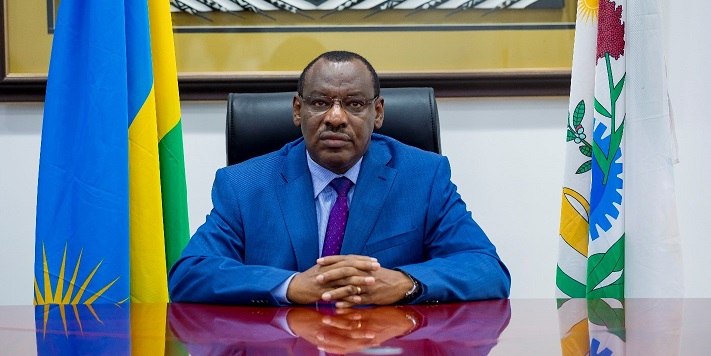24 June 2020: Minister of Infrastructure, Hon. Claver Gatete has joined the rest of the commonwealth member countries and organisations to deliver a series of virtual events, focused on Sustainable Urbanisation across the Commonwealth, organized by the Commonwealth Association of Architects.
The inaugural event kick-started the full programme of online webinars to take place from 24th June to 2nd September 2020 objectively to champion a call to action on sustainable urbanisation in the Commonwealth.
The official launch was graced by a message from His Royal Highness, The Prince of Wales, with contributions from Hon. Claver Gatete, Minister of Infrastructure, Rwanda, Mr. Kalim Siddiqui, President, Commonwealth Association of Architects, Dr Joanna Newman MBE, Secretary General, Association of Commonwealth Universities; and the Chairperson of Commonwealth Local Government Forum (CLGF), Rev. Mpho Moruakgomo.
In his keynote address, Minister Gatete, has said that Rwanda is keen on playing its role within the Commonwealth to help ensure a more comprehensive and coordinated approach to sustainable urban development.
Gatete said that the Commonwealth provides many opportunities to learn from each other and to share and develop good practices.
“Rwanda is therefore delighted to be part of this Commonwealth initiative – the potential of which we so strongly sensed as part of the Commonwealth programme at the 10th World Urban Forum in Abu Dhabi in February this year,” he said.
The Commonwealth Association of Architects launched a series of programmes aimed at championing the call for action for sustainable urbanisation.
The Minister said that the context of COVID-19 has inevitably led to pressures, needs and opportunities associated with sustainable urbanisation to dramatically grow.
“As a result, now we have an even deeper relevance to countries right across the Commonwealth,” he noted.
Under the National Strategy for Transformation, Rwanda targets to accelerate urbanization to reach the urban rate of 35 per cent by 2024 from 18.4 per cent in 2017.
This is done through several initiatives including investments in the development of secondary cities.
Gatete highlighted that the Green City Kigali project, which is being technically supported by the Commonwealth Association of Architects, is another initiative the country is pursuing to demonstrate the possibility of sustainable urbanisation.
“[This] is also another initiative that models social cohesion, equality and inclusion directly through urban design,” he noted.
Minister Gatete said that the project sets standards for affordable housing solutions and local employment opportunities. It also initiates a paradigm shift towards green urbanisation providing answers to one of Africa’s – and in many ways the Commonwealth’s – biggest challenges of tomorrow.
However, Minister Gatete noted, challenges like insufficient affordable housing to accommodate the new urban immigrants, and inadequate municipal finance to enhance local economic development remain.
“There is also insufficient capacity and coordination to mobilize and engage contributing development partners”, he added.
As part of the preparations for the 2020 Commonwealth Heads of Government Meeting, that was due to be held in Kigali, Rwanda this week, CLGF has partnered with the Association of Commonwealth Universities, the Commonwealth Association of Architects and the Commonwealth Association of Planners, with support from The Prince’s Foundation, the Rwandan Ministry of Infrastructure, the Ministry of Local Government, the Commonwealth Engineers Council and others, to develop a call to action on sustainable urbanisation in the Commonwealth.
With nearly 50% of the projected increase in the world’s urban population by 2050 expected to be in the Commonwealth countries, there has never been a more important time for members of the Commonwealth to come together to tackle the challenges of climate change and rapid urbanisation; challenges which have now been compounded by the effects of the Coronavirus pandemic.

 ENGL
ENGL KINY
KINY